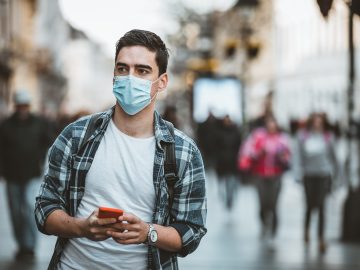Months after the first confirmed case, COVID-19 continues to affect nearly every aspect of daily living. When it comes to technology, COVID contact tracing apps are the latest development. In an effort to better understand American’s feelings about COVID contact tracing apps, Avira referred to a third-party survey that asked the tough questions.
The survey revealed that the majority of Americans do not plan on downloading or installing a COVID tracing app, citing privacy concerns as the main reason. And Americans aren’t alone in their concerns. Just as COVID is a global issue, so is digital privacy. Here’s where America – and the world – stands on COVID tracing apps.
Are tracing apps trustworthy?
Just over 2,000 Americans participated in research firm Opinion Matters online survey, answering a variety of questions related to COVID, tracing, and privacy. Completed on June 1, 2020, the survey results pointed to an overall theme of concern and distrust amongst Americans regarding COVID tracing apps.
Over 71% of Americans responded that they do not plan on downloading or following instructions from a COVID contact tracing app. The main reason? Americans have serious concerns that the technology won’t protect their digital privacy.
This isn’t just a concern amongst conspiracy theorists. According to the survey, 84% of Government and Healthcare workers do not plan on using a COVID tracing app. Mistrust in these industries could suggest Americans have a legitimate reason to be concerned.
Who do Americans trust to safeguard their privacy?
From Big Tech to state governments, the race to develop an accurate and safe tracing app has been in action for several months. In the Opinion Matters survey, Americans were asked if the provider of an app would influence their comfort level. Over 40% of Americans responded that they wouldn’t trust any organization to keep their data secure and private.
But when given the choice, Americans are more willing to put their trust in Big Tech. To be more specific, Google and Apple are the first companies 32% of Americans would trust with their health data and privacy, followed by Microsoft. Government and educational institutes are the least preferred maker of a COVID app with just 14% of Americans confident in their ability to protect tracing data.
Location of stored data matters
It’s not just who makes a tracing app that matters to Americans. It’s also where collected data is stored. Roughly 75% of Americans believe their digital privacy would be put at risk if the government has access to stored data on centralized servers. But if data must be shared, Americans were most comfortable allowing hospitals to store and access their health data, followed by Big Tech companies like Google and Apple.
Americans aren’t alone in digital tracing privacy fears
Americans aren’t alone in their concerns about privacy in regards to COVID contact tracing apps. Countries all over the world are making technology part of their battle plan against COVID, including France, Italy, Norway and the UK, and most citizens are just as concerned about privacy as Americans.
France was the first major European country to utilize smartphone technology against the pandemic with their StopCovid app launching to mixed reactions. While some citizens view it as a helpful step they can take, similar to social distancing or wearing a mask, many are avoiding the app due to privacy concerns. The issue many French citizens have is that the data is stored on government-run centralized services, making many believe tracing apps are a gateway to an overreach of government surveillance. However, French government says the app doesn’t track location data and all stored data is deleted after 14 days.
Italian citizens are also concerned about tracing apps with only 44% of Italians saying they will download Immuni, the country’s tracing app designed with software from Google and Apple. By utilizing Big Tech, citizens may feel more comfortable participating in volunteer contact tracing. This may be encouraged by the promise that neither users’ personal or location data will be collected and all data will be deleted by Dec. 31, 2020, or once the health emergency is over, whichever comes first.
Even more telling is Norway’s recent decision to immediately suspend their app, Smittestopp, due to concerns raised by the country’s data protection authority. Unlike other national apps in European, Norway’s app was tracking real-time GPS data, meaning it was continuously uploading location information of its users which the watchdog group found to be an threat to user privacy.
While most parts of Europe do their best to convince citizens to participate in tracing efforts, the UK has put their COVID tracing app on the backburner. The country has decided to focus on a more personal approach, using humans rather than text to inform citizens of potential COVID exposure. While the government cites improved accuracy as the reason for the switch, it’s not out of line to suggest apprehension from citizens over digital privacy may have been a factor as well.
Will we ever trust tracing apps?
The future of COVID tracing apps is hazy. While there are still several technical concerns to iron out, there is deep global distrust regarding contact tracing and digital privacy. For many citizens, the risks of using a tracing app outweigh the potential benefits. And until local governments and Big Tech can guarantee otherwise, it’s unlikely there will be a major shift in opinion.













